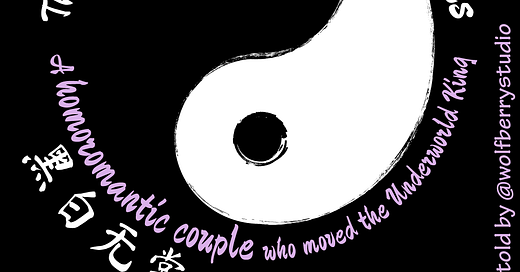The Black and White Impermanences: a homoromantic bond that moved the King of the Underworld
The love story of Fan Wujiu and Xie Bi’an
[Content note: mention of suicide]
The Black and White Impermanences (Heibai Wuchang) are minor deities who escort the spirits of the dead to the Underworld. Before they came into their current jobs, they were once human. This origin story was attributed to Dictionary of China’s Gods and Monsters, published by Renmin Chubanshe in 2009:
So it was said that there were two men Fan Wujiu and Xie Bi’an, natives of Min County (present day Fuzhou) in Fujian province. They swore brotherhood as children. Fan Wujiu was short and dark, Xie Bi’an was tall and pale. One day, they came to Tainan bridge together. Seeing that it was about to rain, Xie Bi’an went home to get an umbrella, telling Fan Wujiu to wait for eir return.
In the ensuing downpour, the river rose quickly. Fan Wujiu, unwilling to leave the spot before Xie Bi’an returned, was quickly submerged by the flood waters. When Xie Bi’an came back with the umbrella, e found that eir friend had drowned. Devastated, e hung emself at the bridge.
King Yama, ruler of the underworld, praised Fan and Xie’s devotion to each other. King Yama appointed the pair to work for the Office of the City God, arresting errant ghosts. [i]
You can view an unromanticized picture of the two at 黑白无常和牛头马面都是鬼差,他们有什么区别? (sohu.com).
The Black and White Impermanences are also known as Lord Seven and Lord Eight, a reference to their positions in the Underworld hierarchy. They are ranked after Ox Head and Horse Face.[ii]
There are variations on the backstories of the Black and White Impermanences. In another version, the two were constables chasing an escaped convict. They decided to split up to search for the convict, making an appointment to rendezvous under the bridge later. But Xie was delayed by the sudden rain, and Fan, unwilling to move from the meeting spot in case eir friend couldn’t find them, was drowned in the rising waters. In yet another version of the story, Xie and Fan were two military officers and in yet another, they were neighboring farmers. But the basic plot remains the same.[iii]
A homoromantic interpretation of their relationship is more than likely, considering that their story paralleled an ancient heteroromantic account in the Book of Zhuangzi, written around 3rd century BCE:
Young Man Wei and a woman arranged a time to meet under a bridge. The woman did not show up. The waters rose but Wei did not leave. Wei clung to the pillar of the bridge and died.
Section “Daozhi” in the Miscellaneous Chapters of Zhuangzi [iv]
The Zhuangzi account predates the legend of the Heibai Wuchang (Black and White Impermanences). The term “wuchang”, meaning “impermanence”, was part of the Buddhist lexicon that entered China through translated scriptures in the 3rd century CE. But according to 黑白无常是哪个朝代起源的神话?on 知乎 , the use of the term “wuchang” as the name of the psychopomps did not arise until centuries later. King Yama 阎罗王 is also not an indigenous deity. Indian in origin, Lord Yama entered the Chinese pantheon through the spread of Buddhism.
Anyway, back to the topic of homoromantic love: a number of danmei novels have taken inspiration from the Black and White Impermanences.
It should be noted that Fan and Xie’s province of origin, Fujian, was well-known for homoerotic unions formalized by brotherhood vows. SCMP article China embraced gay ‘marriage’ long before Taiwan’s law. The West perverted history mentions Fujian’s gay history:
Shen Defu, a Chinese writer during the Ming dynasty, wrote that it was common for men of all social classes in Fujian province to take male lovers… The older man would be considered qixiong (adoptive older brother) and the younger qidi (adoptive younger brother).
Qixiong and qidi are more accurately translated as “sworn older brother” and “sworn younger brother.”
However one might chose to read Xie Bi'an and Fan Wujiu’s sworn brotherhood - as homoromantic, queerplatonic or a bromance, it remains that the King Yama chose to honor this non-heteronormative relationship by deifying the pair and letting them remain together forever. (Most other souls of the deceased move on to new lives eventually, and heterosexual unions in land of the living don’t always persist in the underworld.)
Notes:
[ii] 黑无常(地府官差)_百度百科 (baidu.com)




